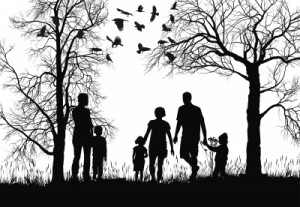Don’t Call Them the Top 20%
 After Christmas this year, Kyle and I visited my parents’ house for a couple days. The looming fiscal cliff was still all over the news, and I opened the newspaper to an infographic on how the various tax brackets would be impacted by different proposals and so forth. The taxpayers were divided into fifths: the bottom 20%, 2nd 20%, middle 20%, 4th 20%, and top “rich” 20%. Kyle and I fall into the middle 20% of earners and my parents fall into the top 20% of earners.
After Christmas this year, Kyle and I visited my parents’ house for a couple days. The looming fiscal cliff was still all over the news, and I opened the newspaper to an infographic on how the various tax brackets would be impacted by different proposals and so forth. The taxpayers were divided into fifths: the bottom 20%, 2nd 20%, middle 20%, 4th 20%, and top “rich” 20%. Kyle and I fall into the middle 20% of earners and my parents fall into the top 20% of earners.
My father looked at the infographic as well and objected to its phrasing. He felt very strongly that the top 20% of earners shouldn’t be labeled “rich.” I tried to point out to him that it was probably just a way to orient the reader to which segment represented the high earners and which segment represented the low earners, but he didn’t want to hear it. In his mind there was a huge difference between the top 20% of earners and “the 1%” and that just because one has a higher income does not mean that one is rich.
At the time, I didn’t understand what he was making such a big deal about. Objectively, his salary is in the top 20% of earners nationally – so what if someone labels that “rich?” It’s at least relatively rich. But after reflecting on the episode, I think I can speculate on why he didn’t want that label applied to his income bracket. First, I think he has some negative connotations about the word rich (not sure what they are or where they come from) so he doesn’t want to be called rich, and second he doesn’t feel “rich” so the label seems inaccurate.
Why doesn’t my father feel “rich” even with his high income?
Self-Identity
My father’s family didn’t have much money when he was growing up. He got scholarships and worked blue-collar jobs as well to pay for college and grad school. It probably wasn’t until the last decade or so of his life that he became one of these relatively high earners, so his self-identity hasn’t had time to change.
High Cost of Living
My parents live in the DC area, where both the median salary and the cost of living are quite high in comparison with the US as a whole. These 20% tax bracket distinctions are for the nation, so even though my parents’ income is high, 1) they have high living expenses and 2) most everyone they know has high incomes as well. They might be objectively earning more when you look at the nation, but they probably aren’t earning or saving particularly a lot when you consider their immediate surroundings, which is all we really do.
Income vs. Assets
When we speak about the 1% or the rich, we don’t usually make a distinction between income and assets, but there is a huge functional difference. A family with a high income has the potential to build up significant assets, but there are plenty of ways that income can be diverted before it gets to savings (such as a high cost of living). A family with significant assets might not have a high wage but still live quite comfortably, either because they don’t have to save/pay of debt or because they supplement their income with returns on invested assets.
Work and Struggle
Perhaps my father subconsciously believes that the rich don’t have to work hard or worry about money, and because he hasn’t reached that point, he can’t be considered “rich” yet. I think at relatively higher incomes, though, whether or not you consider that you are still struggling for money has more to do with personality than objective reality.
Why do you think some people have negative connotations with being called rich? Would you consider yourself rich because of high income or high assets? Which 20% are you in?
photo from Free Digital Photos
Filed under: psychology · Tags: high income earners, the 1%, the top 20%

 What’s the Deal? Are We Poor?
What’s the Deal? Are We Poor? When Top-Down and Bottom-Up Budgeting Clash
When Top-Down and Bottom-Up Budgeting Clash Whose Money Is It, Anyway?
Whose Money Is It, Anyway? Favorite Posts, Mentions, and Top Comments Week of 24Feb2013
Favorite Posts, Mentions, and Top Comments Week of 24Feb2013


I’m pretty sure we’re in the top 20% income-wise, but we don’t consider ourselves rich because 1-we’re not financially independent, and 2-we don’t live a lifestyle of extravagance. We live more like someone who makes half (or less) of what we do.
Mrs. Pop @ Planting Our Pennies recently posted..The Great Bar Soap Experiment
So you define “richness” more by spending than by income/assets. That means that someone who is living beyond their means and racking up debt could be “rich,” no?
I heard this short interview on NPR a couple months ago that really stuck with me for how different interviewees thought about being “rich” (based on tax compromises under debate pre-fiscal cliff). One, who would’ve been affected by proposed tax hikes because his income was >$450K, said he didn’t think he was rich because a) he saw other people able to buy much more expensive things than he was and b) he still had to worry about things like saving for retirement and his kids’ college. The second, who might have been depending on the deal because her income was >$250K, said, “Yes, I’d say I’m rich. You can always find someone with more money to compare yourself to, but the worries I have are really luxuries, like whether I’m building up enough savings for retirement and my kids’ college.” I really liked the second caller’s perspective.
I concur. Thanks for relating that juxtaposition!
You have to remember that most people will almost always identify themselves as middle class even if they are in the top tax bracket. That’s just the way it is. So no, they won’t say they are rich
My parents definitely identify as middle class! You are so right.
I think part of the reason behind the negative connotation is that there has been a growing divide between the “haves” and “have nots”. While being in the top 20% might mean you make a good living, there is a major difference between that and the top 1%.
John S @ Frugal Rules recently posted..5 Fun and Frugal Super Bowl Party Ideas
They’re certainly not “the 1%” but I’d still say they are “haves.” I am a “have,” too!
I don’t think your father wants to be labeled because of how the nation feels about the “rich”. With all of the politics going around, people that are labeled rich are viewed as evil. I wouldn’t want to be labeled as such, though I am not where close to the rich level.
Grayson @ Debt Roundup recently posted..Change Your Lifestyle, Increase Your Savings
That’s true, the rich (and poor, too) are being vilified. I guess that’s why everyone identifies with the middle class!
Many people would identify me as rich because of my net worth and other factors. I always felt the rich was someone else and probably always will. I think it is because of the definition. I can do almost anything I want, but don’t call me rich! I think it is the word more than anything. I don’t mind being called successful and isn’t rich the result of success? Go figure!
krantcents recently posted..Writing your will without a lawyer: Is it possible?
Do you like the word “wealthy” more than “rich?”
I think you make some great points on this topic Emily. There are a lot of factors that go into whether or not someone considers themselves wealth or not. For me, that fact that I live in America makes me one of the wealthiest people on the planet. If I ever need a good reminder of that I always like to visit http://www.globalrichlist.com as it puts my finances into perspective.
Jon White recently posted..JW’s Financial Coaching Podcast Lesson #25-The 4-1-1 on eFinPlan and Financial Planning with guest Kent Irwin
I totally agree, Jon. I hope I still agree when I have my father’s income!
Add in the rest of the world and your parents are both rich and in the top 1%. “Rich” is definitely a state of mind. Just go to most non-western nations and you’ll be amazed how rich our middle class is. However, we compare our wealth to our neighbors and since our neighbors are uber rich, we feel less wealthy.
Wayne @ Young Family Finance recently posted..Saving Money for a Puppy
I know intellectually how rich we all are, but I guess it didn’t feel like the right time to lecture my dad about the “have-nots!”
What methodology was used to determine the quintiles? Is it top 20% of incomes, or top 20% of income earners? Or the top 20% of household incomes? The first two will create subtle differences, and the last a huge difference. There is a $12000 difference between mean income and mean household income!
Edward Antrobus recently posted..Cell Phone Tethering for Free Wifi
If I remember correctly the chart was for household income, but it did go over different scenarios of married, single, single parent, etc.
The rich have been vilified the past few years, so being called rich when you still have financial insecurities and you’re not set for life can be frustrating.
I used to live in DC, and I think it’s all relative. I’m sure being in the top 20% in Potomac is very different than being in the top 20% of all of America.
Daniel recently posted..What’s the Better Bargain: Automatic Payments or Paying in Advance?
Haha, my parents don’t quite live in Potomac but you are totally right. So you define rich as being “set for life” i.e. independently wealthy?
We certainly aren’t “rich”, but I can understand why your parents might not want to be labeled as being, “rich” given all the hate on “rich people” lately. Good for them for working hard and doing well.
KK @ Student Debt Survivor recently posted..My Finances, His Finances, Our Finances?
My dad does work very hard but I’m sure nearly all “rich” people do. I guess it has been a particularly intense time of “down with the rich”-ness recently.
I live in DC and can definitely sympathize with your father. One of the things that frustrates me the most about living in the District is that income tax rates are extremely high (and this is coming from someone who grew up in New York City). I’m not sure if your father lives in DC, MD, or VA, but the state income tax situation can vary substantially from state to state. I’m considering moving to Maryland so that I can take more of my paycheck home in the future. Heck, I might even have to make the big move to Tennessee or Texas one of these days.
Natalie recently posted..Paying Yourself First
My parents live in VA, thankfully! I think my parents’ plan is to retire in a lower cost-of-living area.
[…] too cited an NPR story she had heard that was relevant to my post on why people with high incomes might not consider themselves rich: “One [person], who would’ve been affected by proposed tax hikes because his income was […]
[…] Don’t Call Them the Top 20% was featured in the Carnival of Money Pros. […]